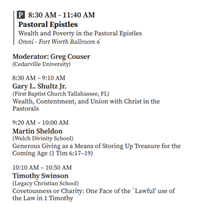Michael G. Sirilla. The Ideal Bishop: Aquinas’s Commentaries on the Pastoral Epistles (Washington, D. C., The Catholic University of America Press, 2017)
This book makes a valuable contribution to Pastoral Epistles scholarship even though its aim is really toward a theology of pastoral ministry. Sirilla says this work fills “a lacuna in the scholarly work on St. Thomas’s theology of the episcopacy” (4) because scholars have tended to overlook Aquinas’s exegetical work. This has impoverished previous work because “many of St. Thomas’s theological reflections on the grace of the bishop’s office are found exclusively in his commentaries on the PE” (5). Sirilla says this is the first study to “substantively examine the theology of the episcopacy” found in Aquinas’s lectures on the Pastorals (5).
I am no scholar of Thomas, so I don’t have the background to evaluate such claims, but they struck me as parallel to what has happened with Calvin, where for many years scholars examined his theological writings and commentaries but neglected his sermons. With Calvin, the academy forgot that Calvin was first and foremost a preacher. With Aquinas, Sirilla argues, scholars seem to have forgotten that “Thomas Aquinas was, by profession, a biblical commentator” (85). In fact, he says that “Neo-Thomists too often neglected the biblical foundations of Aquinas’s theology” (84).
Here are a few representative quotes from Sirilla on the significance of the theology in Aquinas’s lectures on the PE:
“The theology that Aquinas develops in his PE lectures is unique both with respect to that of his peers and with respect to what he says about the episcopacy in his other writings.” (20)
“Aquinas’s writings constitute a monumental development in the history of the theology of the episcopacy.” (29)
“It is only in Aquinas’s commentaries on the PE that we find a comprehensive treatments of the intellectual, moral, and spiritual qualifications required of one suited for the episcopal office, along with a nearly exhaustive treatment of the dangers and lofty duties that this office entails.” (69)
Then he cites Ceslas Spicq’s assessment of these lectures:
“The commentary of the Pastoral Epistles…dates from the last years of St. Thomas’s life, and it constitutes not only one of the best scriptural works that he had composed, but a masterpiece of medieval exegesis…. Undoubtedly, from a philological and historical point of view it is outdated, but it will always be consulted fruitfully for its psychological observations and above all for its theological elaboration.” (70)
As a Protestant, I do not follow various aspects of the view of the bishop Aquinas expounds, but there is much else with which I heartily agree and found helpful such as the strong emphasis on personal holiness and the centrality of teaching to the pastoral office. Aquinas also echoes Gregory’s important points about the need to a pastor to know his people individually and to tailor his instruction to their needs (159; commenting on 1 Tim 5:1-2). Sirilla summarizes Aquinas as teaching that “the bishop’s teaching and governing duties… ought to be expressions of loving service and not of a domineering spirit” (234).
Then, pertinent to this blog, this monograph is very useful as a guide to one aspect of the history of interpretation of the PE. I have a copy of Aquinas’s lectures (Commentaries on St. Paul’s Epistles to Timothy, Titus, and Philemon, trans. Chrysostom Baer [South Bend, IN; St. Augustine’s Press, 2007]), but having a guide walk me through the commentary noting where Aquinas differed with contemporaries and providing explanation was immensely helpful. Precisely because Aquinas stands outside contemporary discussion, I am keen to see what questions the text prompts for him and where he goes with application.
For example, I was quite interested in Aquinas’s overall view of each of these letters. He wrote:
“[Paul] instructs the prelates of the churches…on the foundation, construction, and government of ecclesial unity in 1 Timothy, on firmness against persecutors in 2 Timothy, and on defense against heretics in the letter to Titus” (100). Aquinas then expounds 1 Timothy as focusing on qualifications for pastoral ministry and specific aspects of fulfilling that ministry such as teaching diverse people, correcting elders, etc. In dealing with false teachers in 2 Timothy, Aquinas also focuses on the need for a bishop to care so much for his flock that he is willing to die for them and he reminds his readers that such martyrdom was no mere abstract consideration in the early days of the church. Then, though Titus discusses qualifications for pastors as 1 Timothy does, Aquinas understands the focus here to be on finding successors in ministry as well as dealing with false teachers once more (Sirilla gives a nice summary on p. 100). Whether or not we agree with this synthesis, here is a serious and influential approach to these letters which deserves consideration.
This book is also a helpful guide to pithy comments from Aquinas on certain texts. Commenting on 2 Tim 2:15, a “laborer unashamed,” Aquinas says of a pastor, “He must confirm in his deeds the doctrine he preaches with his mouth; if he does not, he deserves to be embarrassed” (190). On 2 Tim 2:17 concerning false teachers, Aquinas says, “For heretics say true and useful things in the beginning; but when they are heard they mix in deadly doctrines, which they vomit out” (190).
Because the author’s aim is specifically the theology of episcopacy found in these lectures he skips a few portions of these lectures. However, this is a stimulating foray into the exposition of the PE by one of the leading teachers in the history of the church. As such we are indebted to Sirilla and can be enriched by attention to this work.


